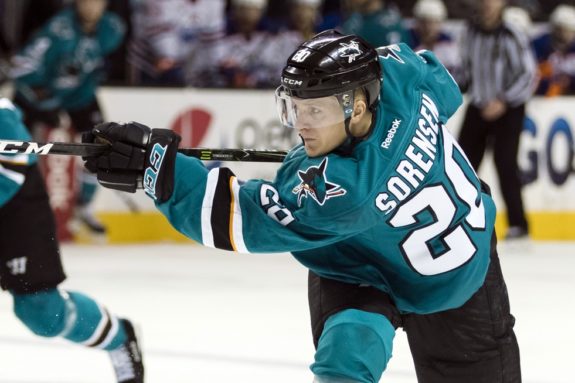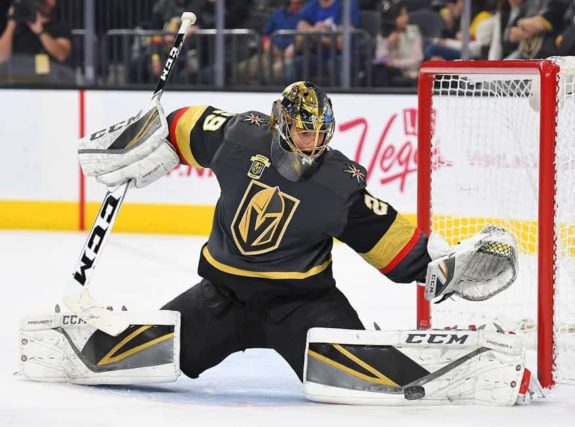When the series between the Vegas Golden Knights and San Jose Sharks begins, one thing is certain. The series will be between two teams with a strong emphasis on ‘team’. This isn’t a series with a bunch of stars. There’s only one player on either team likely to make the Hockey Hall of Fame, and that guy, Joe Thornton, happens to be injured.
If you had a multiple choice question for the list of reasons each team succeeded this season, you’d select the box labeled “all of the above.”
Eighteen Skaters
When the 18 skaters hit the ice for each team, both teams know it’ll take all 18 to make a difference. Neither team thinks much about shortening its bench or worries much about specific matchups. They are more concerned about keeping up the intensity for 60 minutes; more if needed. To accomplish this, it means everyone plays significant minutes. And everyone has to find ways to contribute.
Some have described Vegas as a team with four ‘second lines’, meaning they lack the top line talent, but every line is good enough to be another team’s second best line. I find this logic odd considering what the Vegas top line has accomplished this season.
William Karlsson (43 goals, plus-49!!), Jonathan Marchessault (75 points, plus-36!!) and Reilly Smith (60 points in 67 games, plus-31) put up numbers which are top line. Not just the top line for a team, but the top line in all of hockey. The individuals may not have long resumes of greatness, but their collective 2017-18 resume is absolutely great.

The Sharks might not match the Vegas top line, but they have great depth. Indeed, it’s hard to figure out which line is the Sharks top line because two groups are both comparably good. The line most people consider the second line features the Sharks’ top two goal scorers, Logan Couture and Tomas Hertl. The Sharks bottom six is as good as any in the league.
The Eighteenth Skater
For each team, the last player in the lineup played a big role in the opening round series.
Only one skater for Vegas, William Carrier, played less than ten minutes in any game in the series against the Los Angeles Kings. Carrier was the player who frustrated Drew Doughty so much in the series’ first game that Doughty went after Carrier late in the contest. Doughty crossed the line with a hit to the head and took a one-game suspension as a result — the Kings could have used Doughty in that game. Doughty, the NHL’s regular season ice time leader, missed the game the Kings lost in double overtime.
The Sharks used Marcus Sorensen the least of any player in their series against the Anaheim Ducks. He was the lone Sharks’ skater to average under 10 minutes of ice time per game. But Sorensen was a major contributor, scoring a game-tying goal in Game 2. In the Game 3 romp, Sorensen scored the Sharks third goal and assisted on the fourth to break the game open. In the series finale, Sorensen scored the game’s first goal, and considering the final score was 2-1, it mattered a bunch.

He was also effective on the penalty kill. Sorensen was on the ice for four Sharks even strength goals (tied for best on the team), and none against (also tied for best on the team). One could make the case that the Sharks’ eighteenth skater was also their most valuable skater in the series.
Calling All Sharks and Golden Knights
For Vegas, winning was about everybody. The seven goals against the Kings came from seven different goal scorers. Twelve players had points against the Kings, including 10 of the 13 forwards who played in the series. Vegas head coach Gerard Gallant, who’ll soon win the Jack Adams Award as the NHL’s top bench boss this season, has a team which finds its comfort zone in close games. In Game 1, they held a 1-0 lead for over 55 minutes. In Game 4, for over 35 minutes. And won both games by the score of 1-0.
For the Sharks, it was, well, also about everybody. The series stats against the Ducks are misleading in some respects, as the 8-1 win in Game 3 distorts the numbers. But like the Golden Knights, the Sharks managed to get just about everyone on the scoresheet, with 15 of the 18 skaters notching at least one point. The three Sharks who didn’t have a point (a defenseman from each pairing) were on the ice for nine of the Sharks ten even strength goals, and only two goals against.
Relentless Hockey
Vegas loves to play at a relentless pace, looking to pounce on the moments where opponents lose track of the play. The Sharks aren’t quite as relentless, but they also know how to take advantage of an opponent’s lapse. It showed repeatedly against Anaheim. Teams cannot play relentless hockey over an extended series without the benefit of competitive depth.
The Golden Knights ice time leader among forwards in their opening series was William Karlsson. Karlsson averaged under 20 minutes per night in the games which ended in regulation. It is a lot easier to have fresh legs when the head coach balances out the ice time.
Among the Sharks, only Joe Pavelski played more minutes than he probably should against the Ducks. At 33, it’s a good idea to limit his minutes to when they matter most. Playing Pavelski for almost 20 minutes in Game 3’s 8-1 victory wasn’t the best idea.

In a series where the pace is going to get pushed, it’ll be up to Sharks head coach Peter DeBoer to keep Pavelski fresh. Of course, the lengthy break between series is a good start.
Goalies Stealing the Show
The goalies have been stars of the show for both teams. Vegas won four games against the Los Angeles Kings, each by one goal. The Kings managed just three goals the entire series. Marc-Andre Fleury was superb and the Vegas skaters played with supreme confidence knowing Fleury was dominating the net.

It wasn’t much different for the Sharks — Martin Jones also posted superb numbers in the opening round. He provided his team confidence, allowing just four Anaheim scores. The Sharks confidence allowed them to be aggressive and it showed in the enormous number of odd-man rushes San Jose had in the series.
Caution in San Jose, Excitement in Vegas
While both teams swept their opening round series, by the numbers, the Sharks sweep looks more impressive, but I’m not sure it was. Their opponents, the Anaheim Ducks, decided it was more important to try and intimidate the Sharks with dirty play than it was to win hockey games. The Ducks lost the first three games, and self-inflicted wounds were a huge part of it. The final game was a different story, the Ducks were outstanding and the Sharks were fortunate to eke out the win.
There is plenty of excitement for this series. The Golden Knights are drawing big crowds – to their practices. Every regular season game between the two teams was close. Two games went into overtime. The other two were one-goal games (excluding an empty net score).
The Sharks were much deeper than Anaheim and the Golden Knights were much deeper than Los Angeles. Depth made a difference in both series. In this series, we’ll see two teams where depth units like fourth lines and third defensive pairings are unusually important. It’s truly is a team game for both San Jose and Vegas. I expect we’ll see quite a series.